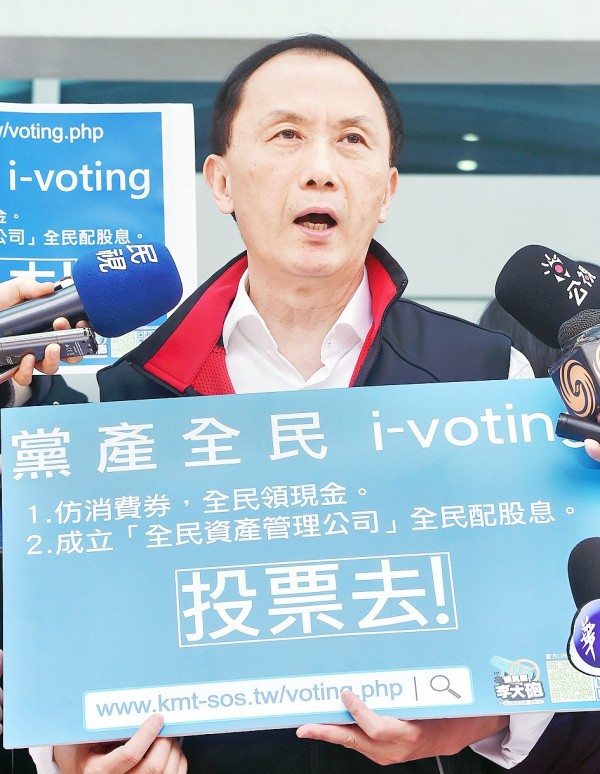《TAIPEI TIMES 焦點》 KMT ASSETS: Lee Hsin touts ‘i-Voting’ on assets

Chinese Nationalist Party (KMT) chairperson candidate Lee Hsin at a news conference in Taipei yesterday holds up a card calling on the public to vote online to decide how to deal with the KMT’s ill-gotten assets. Photo: Liao Chen-huei, Taipei Times
By Stacy Hsu / Staff reporter
Chinese Nationalist Party (KMT) chairperson candidate Lee Hsin (李新) yesterday invited the public to help decide how the KMT’s “ill-gotten” assets should be handled via online voting, pledging to let openness and transparency stop being just a campaign slogan for the party.
Clad in his usual jeans and sneakers, Lee held a news conference in front of KMT headquarters in Taipei yesterday morning to announce the launch of two online referendums on his campaign Web site, http://kmt-sos.tw/voting.php.
One of the referendums asks the public whether they agree with Lee’s proposal to equally distribute the KMT’s legitimate assets to all party members, while returning all ill-gotten assets to the public.
The other one seeks to gauge voters’ opinions on the best way to handle the KMT’s ill-gotten assets: liquidating the assets and distributing the profits to the nation’s 23 million people in the form of consumer vouchers; or establishing a “public assets management company” governed by the law to oversee the assets and regularly allocate revenue from the properties to all citizens.
“The KMT has two kinds of assets: legal and ill-gotten. The legal kind should be distributed to party members, while the ill-gotten part ought to be returned to the people, not the government,” Lee said.
He said that if the KMT’s ill-gotten assets were to be given back to the government, they would most likely be sold off and fall into the hands of deep-pocketed corporations.
“That is why I believe dividing the assets to the 23 million Taiwanese would be the most legal, rational and appropriate approach,” he said.
Leaning toward the establishment of a public assets management firm, Lee, a Taipei City councilor, said it would be in the public’s interest to allow such a company to manage the KMT’s ill-gotten assets, as the land or properties the party owns could be converted into student dormitories and start-up hubs for young entrepreneurs, or be used to build public housing to shelter economically disadvantaged families.
“Also, each Taiwanese, from birth to death, would be entitled to receive a portion of the revenue from the assets... Such a policy would also be conducive to driving up Taiwan’s dismal birth rate,” he said.
Lee said that although his relentless pursuit of the thorny issue of KMT assets has prompted his friends to advise him to wear a bulletproof vest, he would remain undeterred and continue to uncover party assets that have been illegally pocketed by a select few.
“I am willing to risk my life to pursue the matter. The KMT’s assets belong to all party members and Taiwanese, rather than a select few or the party chairperson,” he said.
Lee is competing against three other candidates in an election scheduled for Saturday — KMT acting chairperson Huang Min-hui (黃敏惠), former deputy legislative speaker Hung Hsiu-chu (洪秀柱) and KMT Legislator Apollo Chen (陳學聖).
In related news, former KMT legislator Alex Tsai (蔡正元) said on Facebook yesterday that Lee did not get the numbers right on the party’s sale of Central Motion Pictures Corp’s (CMPC, 中央電影公司) building on Taipei’s Bade Road in December 2005.
The Bade building was one of many CMPC properties that were sold to Want Want China Times Group (旺旺中時集團) subsidiary Jungli Investment Co (榮麗投資公司), which also purchased two companies the KMT held at the time: China Television Co (CTV, 中視) and Broadcasting Corp of China (BCC, 中廣公司).
CMPC was subsequently sold to Lor Yu-chen (羅玉珍) and Chuang Wan-chun (莊婉均) in April 2006, before being bought by Cheng Uei Precision Industry Co (正崴精密) chairman Gou Tai-chiang (郭台強) for NT$3.1 billion (US$95.3 billion at current exchange rates) later that year.
Lee said on Sunday that the KMT sold the Bade building for NT$2.2 billion, but party officials in charge of finances only wrote NT$800 million in the contract and marked the remaining NT$1.4 billion as a “returned profit,” which never appeared in the KMT’s account books.
“The selling price for the Bade building in the contract was actually NT$1.5 billion,” said Tsai, a former president of CMPC. “The contract also stated that the profit earned from reselling the property within three years should be returned in its entirety to the KMT.”
Tsai said the “profit-return clause” included in the contract was designed by a law firm and that no one, except the KMT leadership, would know the exact amount of profit the party received.
新聞來源:TAIPEI TIMES












